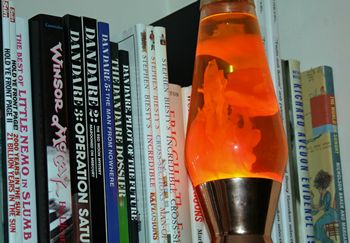2010 — 1 October: Friday — rabbits!
Somehow1 it's now 09:38 and pouring with rain. It's uncanny: how does the Universe know I need to pop out and do some supplies cupboard refilling? It's (almost) enough to put a chap off his breakfast.
Having just been reading about the rise in the minimum wage (here) it's sort-of amusing to contrast the new minimum wage for apprentices (£2.50 an hour) for those under 19 years old with the awesome size of my first-ever paypacket as a not-quite-18 year old apprentice in the aircraft "biz" back in October 1969. At the new minimum rate, I would have been paid almost 20 times more.
How igNobel can you get?
Although the main site is down at the moment it's possible to see plenty of summaries of this year's awards. BP, for example, takes the Chemistry prize for successfully mixing oil and water. And, according to the Telegraph, for example, some "Italian physicists investigating organisations won the Management Prize after mathematically proving that randomly promoting employees actually made a company run more efficiently. They found that contrary to popular opinion members of a 'hierarchical organisation climb the hierarchy until they reach level [sic] of maximum incompetence'."
Surely Laurence Peter beat them to that manglement insight back in 1969?
It's just gone noon. I was greatly amused a short while ago watching an enormous Bentley trying to get out of a non-Bentley-sized parking slot in the Waitrose car park. I slid past him effortlessly and made my laden escape. Tee-hee.
Maligning Tiffany's
I was reminded of the wonderful conversation2 in David Lodge's Nice Work while reading this review of a book by Sam Wasson about the filming of Truman Capote's novella "Breakfast at Tiffany's" — source and snippet:
The most valuable thing about Wasson's book is the fond detail he applies to the extensive process of compromises with which this delicate material was turned into a reasonably successful movie. (It reminds me of an occasion when I gave what I thought was a rigorous lecture on John Berger's dismantling of advertising, only to have a student come up to me at the end, thanking me from the bottom of his shallow heart, and telling me I had changed his life — he was going to go into advertising.)
Having seen the film before I read the book, I had no idea at the time that Paul was originally gay, and no very clear understanding that Holly was a prostitute. That's Hollywood for you, I guess. Only Mr Thomson, by the way, (as he touches on another favourite film of mine — The Lady Eve) could write "... in the breath-stopping scene where she gets Henry Fonda to tend her damaged ankle, you see what a lewd, permissive dildo censorship could be". Crikey!
Must be time for lunch. It's 13:59 and still very moist out there.
Finally!
The rain seems to be stopping. The book-sorting and sifting carries on regardless, of course. I think when (if) I ever finish, I shall photograph each shelf just for the hell of it. My goals are really quite simple:
- to get every book up off the floor (failing, so far)
- not to have books in front of other books on shelves (failing, so far)
A longer term goal, of course, is to clear the cubic metre or so of mostly German books malingering on my dining room table. It's 16:01 and my next cuppa is overdue.
There's been a Hollywood remake of "Let the right one in". Why? Mind you, the NYT review here does make it look quite interesting. And it's got Richard Jenkins in. He was stunningly good in "The Visitor".
Shining a lava lamp on...
... the intellectual corner of my little library should be amusing:
How about an evening meal, Mrs Landingham? After all, it's now 18:34 and I'm starving.
